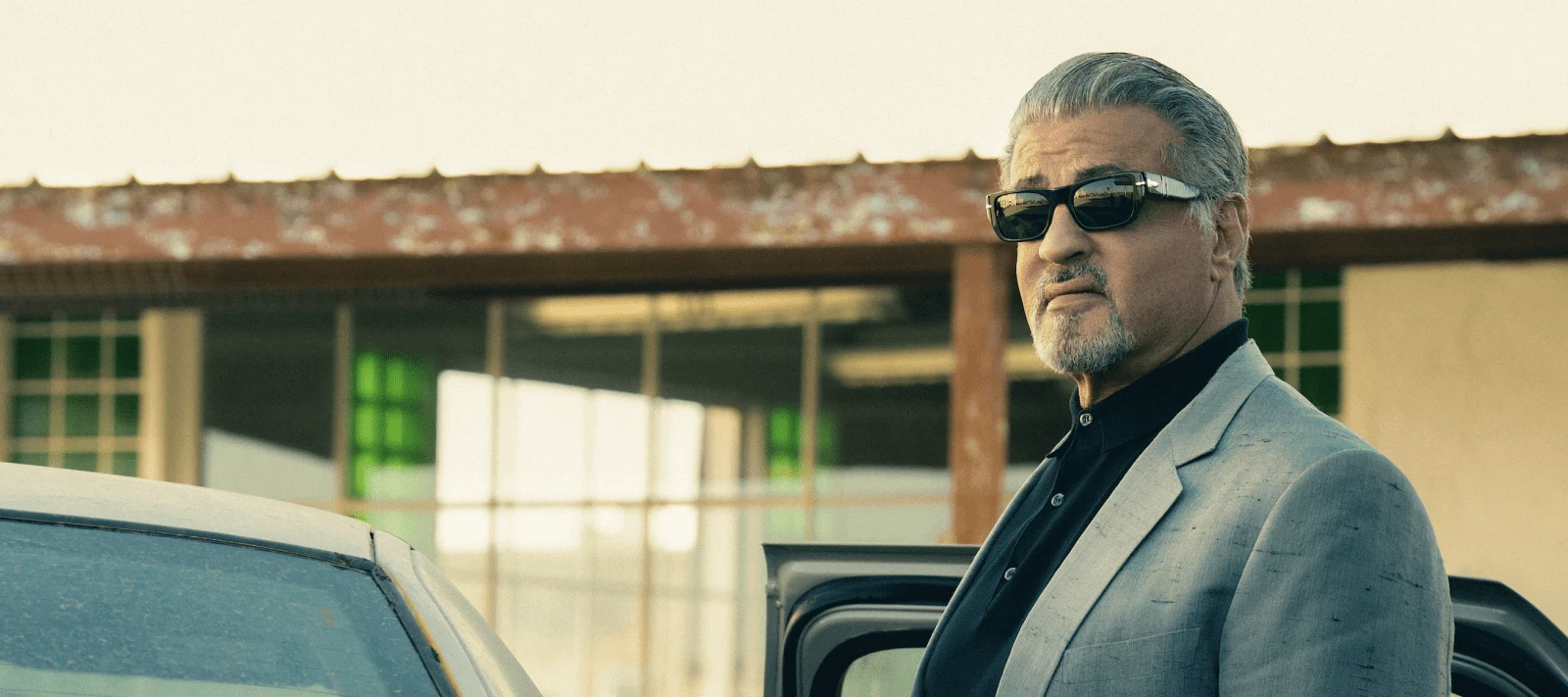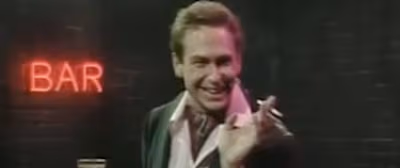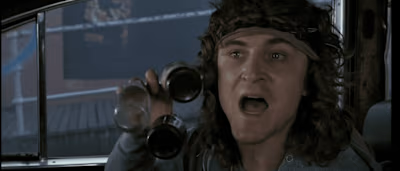Sylvester Stallone on ‘Tulsa King’: ‘If it bombs, I know I have…

Sylvester Stallone as Dwight 'The General' Manfredi of the Paramount+ original series 'Tulsa King.' (Brian Douglas/Paramount+)
Nov 17, 2022
The icon discusses acting more like himself onscreen for the first time — and reminisces about ‘Lords of Flatbush,’ 50 years on
Sylvester Stallone may need no introduction, but he wouldn’t mind a re-introduction. Which is exactly what you get with his new Paramount+ show “Tulsa King,” streaming now. Stallone shows up as himself in a way that he hasn’t been able to in his previous roles, however iconic.
In “Tulsa King” Stallone plays Dwight “The General” Manfredi, fresh out of a 25-year stint in prison. A Brooklyn mafia capo who refused to rat, he expects to be rewarded for his loyalty. Wrong. Manfredi is sent to Oklahoma to establish a foothold in Tulsa. Surprisingly, the fish-out-of-water septuagenarian makes a splash and manages to cobble together a family of misfits.
“Dwight acts the way I act around my house with my wife and my daughters,” says Stallone. “Being yourself is actually the hardest thing to do.” His Dwight is friendly and avuncular unlike, say, Tony Soprano. That is, until someone pushes his gangster button.
People might expect a darker series from showrunner Terence Winter, who helped lead the “Sopranos” to greatness and created “Boardwalk Empire” with Martin Scorsese. Originally, the show was written by Taylor Sheridan (“Yellowstone”) as existentially dark. It didn’t work for Stallone, having played dark in “Rambo” and “Rocky.” Instead, Sly envisioned a show he calls “kind of odd.”
“This show is refreshing, because he’s a gangster who doesn’t want to hurt anybody,” says Stallone. “He really doesn’t.” When he does, for example in the second episode of the series, it’s an act of last resort. “This wasn’t necessary at all,” Dwight says after cold-cocking a bigot.
Stallone was spotted filming “Tulsa King” on Bedford Avenue in Williamsburg last May, and series showrunner Terence Winter tells us to keep an eye on the show for neighborhood cameos. Of course, it’s not the first time the “Rocky” actor filmed in Brooklyn: Stallone received his first bonafides for acting alongside Henry Winkler in “The Lords of Flatbush,” which was filming in East Flatbush and Coney Island 50 years ago this week.
Brooklyn Magazine sat down with Stallone to discuss “Tulsa King,” getting comfortable in his own skin on screen and filming “The Lords of Flatbush” half a century ago.
Excerpts:
50 years ago this month you were filming “The Lords of Flatbush” in East Flatbush and Coney Island. What do you remember from that?
“The Lords of Flatbush” was what you call a real handmade kind of film. “We raised $15,000? Okay! We can shoot for another month.” And when the money ran out, not shoot for three months. In the downtime I would gain weight and have to lose it. It took about two and a half years to make that movie and it was funded by a dentist. My pay was [that] I got to keep my character’s motorcycle jacket. There wasn’t even a SAG day rate. It was amazing. That was the first time I got to test out my writing in some of the dialogue scenes and it didn’t go so bad. Originally, Robert De Niro, Richard Gere, and Michael Moriarty were involved. People kept coming and going and it turned out the way it did, but it was an extraordinary experience. We were stealing locations and being chased by people. For real, it was great.
You’re a writer and director, so I’m curious if you went off script to make the “Tulsa King” character Dwight your own?
All the time. At first they told me I can’t do this, and I go, “Yeah, I can. I have to.” It’s what I’ve always done with “Rocky” and “Rambo,” I always go off script just to add a little spin or a little wisecrack at the very end of something. To me, it makes it fresh. Because, guys, imagine saying the same line 10 times in a row? After a while, you begin to question your sanity. You ask, “What does this guy want?” I tell other actors too, I say “Just add an extra two words in there. It’s going to throw the whole rhythm off, and you’ll feel refreshed.” So yeah, the answer is I went off script all the time. It’s all fine.
Dwight’s been in prison for 25 years and is out of touch with technology and how the world works. Was that also something you added?
The preparation for that is actually not far off from the truth, because just as I get used an iPhone, it’s almost become obsolete. I watch my daughters and I’m in constant denial about how archaic I am. I don’t try to outsmart the audience. Dwight brings up old TV shows a few times and things he thinks everyone can relate to, like a disco, because he thinks he’s being hip. Here’s the thing: embrace your awkwardness. I never tried to be hip, I just tried to be functional. Dwight just wants to play with his grandchildren and make a few bucks. He’s not interested in being this ambitious killer at all.
When the “Sopranos” was on, you said you’ve always wanted to play a gangster. What did you think of “Tulsa King” when the story came to you?
In the original idea for the show, Dwight was pretty thuggish. He was a guy who lived in an apartment and in the opening scene he shoots a mirror out by accident. He threatens his neighbors. I read that and said, “Whoa.” Then he goes out and starts taking over strip joints by hitting guys in the head with a champagne bottle. That’s not cool at all! I don’t like that. So we added the aspect that he’s been imprisoned and never ratted because he was loyal. When he gets out he’s supposed to be given a reward, like everyone who follows the rules is expected to get. And it’s denied. So everyone is going to be empathetic to his cause, because, like, Jesus. Is there even no honor among thieves? When he’s sent to Tulsa, he could succumb to loneliness without the guys he thought were his buddies. Instead, he builds a whole new infrastructure with cowboys and Indians and nerds and computer geeks, you name it. And that becomes his new family. We all finally agreed on that and I think it turned out pretty well. The show gets crazier. Believe me.
Dwight talks about some of the classic books he read in prison, including “Faust.” Does Dwight feel like he made a deal with the devil or is he the devil?
[Laughs.] I think he starts out as a devil, but he’s also been enlightened. He’s always quoting Marcus Aurelius, Dante, and different philosophers. He’s even citing Copernicus because he studied math. He’s really quite bright. He makes everyone rich because he understands numbers and the stock market because he put his time in prison to good use. It makes him a formidable opponent. Eventually, something happens with his family and he has to change and put his enlightenment to use. He realizes “I hate who I am,” but he’s a little old to find a new profession, so he decides he’s won’t be vicious. He’s not going to be a killer. He’ll continue to do his nefarious things, but in the context of what’s going on, he’s not violent. Except once. [Laughs.] And then he’s really violent.
What’s it like to embrace the funnier side of your personality and not have to play a character like Rambo or Rocky?
It is the most liberating feeling because I never thought it was ever going to happen. I used to have to tell people that Rambo is a performance. I’m not really that monosyllabic, dark and petulant. I really don’t talk like Rocky either. People always assumed that’s who I am. This one, finally, is liberating because it is who I am. Dwight talks how I talk. This is how I roll. And I thought, let me just see if this works. If it bombs, then I know I have a shitty personality. If it works, great, because I’ve been a class clown my whole life, believe me. That’s why as a kid I went to 13 schools in 12 years. I’m very, very hyperactive and I thought I’d put it in this character to see if it flies.
Dwight gets prison after 25 years and he’s getting a second chance. What does having a second chance mean to you?
Oh man, this subject fascinates me the most because it’s one that we constantly seek, which is redemption. We all make these carnal mistakes, God forbid, whether it be you married the wrong girlfriend, got the wrong job, a parent relationship, whatever it is, and you go “God, could I just get a second shot at this?” This show is a perfect vehicle and format for my philosophy in life. I’m always drawing on the way I feel to create Dwight because I feel like I’ve made so many mistakes. His sense of redemption is a journey that I have been on many, many times. I just try to make it not so lugubrious, not so morbid. But I’m probably feeling more guilty than I should because I have this persecution complex. But you know what? It pays off. [Laughs.] Anyway, the persecution complex is good for writing.
Like this project
Posted Sep 21, 2023
The icon discusses acting more like himself onscreen for the first time — and reminisces about ‘Lords of Flatbush,’ 50 years on.
Likes
0
Views
25





